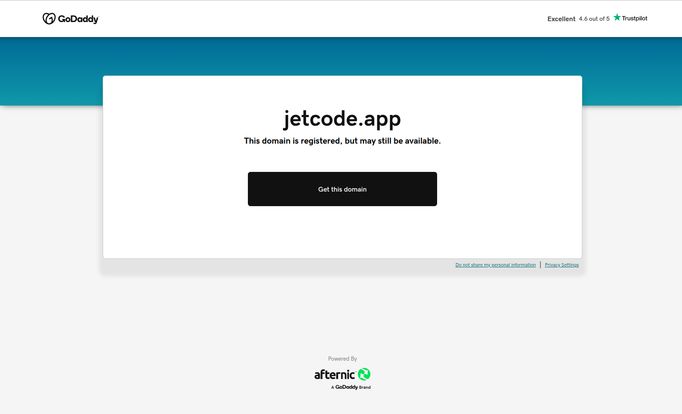If you've spent any time managing an engineering team or even just wrestling with your own side projects, you know the grind. The endless cycle of research, boilerplate code, debugging cryptic errors at 2 AM... it's a rite of passage, but man, it can be a drag on productivity. For years, we've been hearing about how AI is going to change all of that. And now, a new name has popped up on my radar: JetCode.
It promises to be a breakthrough AI software development platform, turning project requirements into actual code. Sounds like a dream, right? But here's the kicker, and what makes this story interesting—when you go to their supposed home, jetcode.app, you're greeted by a GoDaddy landing page. More on that little mystery later. For now, let's talk about what JetCode claims to be.

Visit JetCode
So, What is JetCode, Anyway?
From what I've gathered, JetCode isn't just another autocomplete tool. It positions itself as a more holistic AI development partner. Think of it like this: you're the lead architect of a building. Instead of just getting a helper who can lay bricks faster, you get an AI assistant who takes your architectural blueprints (your project requirements) and spits out a detailed, step-by-step construction plan, complete with pre-fabricated sections (the code). The goal is to slash the time spent on the tedious stuff—the research, the troubleshooting, the “how do I center a div again?” moments that plague us all.
It’s designed for engineering managers and their teams, aiming to turn that bottleneck of initial setup and research into a smooth, flowing highway of productivity. A bold claim, for sure, but one that gets my attention.
The Core Features That Make JetCode Tick
A tool is only as good as its features, and JetCode seems to have a few compelling ones. It's not just a single-trick pony.
AI-Powered Code Generation
This is the main event. The idea is you feed JetCode your system requirements, and it generates ready-to-use code. We’ve seen this with tools like GitHub Copilot, but JetCode seems to frame it as a more structured process. It's less about suggesting the next line and more about generating entire functional blocks based on a clear prompt. This could be massive for scaffolding new projects or building out standard features.
Detailed Implementation Guides
This is where things get interesting for me. Generating code is one thing; understanding and implementing it is another. JetCode apparently provides step-by-step guides along with the code. This is huge. It's the difference between being handed a fish and being taught how to fish. It could help junior developers get up to speed faster and ensures that the team isn't just blindly copying and pasting code without comprehension. It bridges the gap between AI magic and human understanding.
Cross-Platform Development Support
Ah, the holy grail. Building for web, mobile (iOS and Android), and maybe even desktop is a massive resource sink. The promise of a tool that can help streamline this process across different platforms is music to any manager's ears. If JetCode can genuinely translate requirements into functional code for multiple targets, it could fundamentally change how small-to-medium-sized teams approach product development. A single team could potentially do the work of two or three.
The Upside of Letting AI Co-Pilot Your Projects
Let's dream for a second. If JetCode delivers on its promises, the benefits are pretty obvious. I'm talking about a serious acceleration of the development process. I remember one project where we spent nearly a week just trying to get a specific payment gateway API to play nice. A tool that could have digested the documentation and given us a working implementation guide would have been a lifesaver. It’s about empowering teams to do more with less, reducing the friction that leads to burnout and missed deadlines. You spend less time debugging and more time building innovative features that actually matter to your users. That's the sales pitch, and I've got to admit, it's a good one.
A Necessary Reality Check: The Potential Downsides
Okay, let's put our skeptic hats on. I've been in this industry long enough to know there's no such thing as a free lunch. First off, the classic GIGO principle—Garbage In, Garbage Out—applies more than ever. The quality of the code JetCode produces will be directly proportional to the clarity and detail of the requirements you provide. Vague requirements will likely lead to generic, buggy, or just plain wrong code that needs significant manual intervention. This isn't a mind reader.
There's also the bigger, philosophical debate. What happens to a developer's creative problem-solving skills if they're always leaning on an AI crutch? I worry that over-reliance could stunt growth, especially for junior devs. The struggle is part of the learning process. While I'm all for efficiency, we can't outsource the thinking that leads to truly elegant and robust solutions. Human oversight and a critical eye will always be non-negotiable.
What About the Price Tag?
Here's where the trail goes cold. There's no public pricing information for JetCode available. This isn't unusual for a platform that might be in beta or stealth mode. If I had to guess, I'd expect a tiered subscription model, probably based on the number of users or the volume of code generation. Maybe a free tier for small projects to get people hooked, with enterprise plans for larger teams. But for now, your guess is as good as mine.
The Curious Case of the JetCode.app Domain
Now, let's get back to that GoDaddy page. What does it mean when a supposedly breakthrough tech platform's domain is up for sale? There are a few possibilities:
- They are in super-early stealth mode. They registered the domain but haven't launched the site yet. They're building in private, and the 'for sale' page is just a default placeholder from the registrar.
- They pivoted or changed their name. The JetCode project might have evolved into something else, and they abandoned this branding.
- The project is defunct. It's possible the idea didn't pan out, and the domain is now just a lingering asset.
My gut tells me it's likely the first option. It creates a bit of mystique, intentional or not. It makes us SEO and tech folks lean in a little closer. I'll definitely be setting up a monitor to see if and when this site goes live.
Frequently Asked Questions about JetCode
- How is JetCode different from GitHub Copilot?
- While both use AI for coding, GitHub Copilot primarily functions as an 'autocomplete on steroids' within your editor, suggesting code line-by-line. JetCode appears to be a higher-level tool, aiming to take broader project requirements and generate entire codebases with implementation guides, acting more like a project scaffolder.
- Is JetCode intended for solo developers or just teams?
- It seems targeted at engineering managers and teams, aiming to improve team-wide efficiency. However, a powerful tool like this would undoubtedly be useful for a solo developer or freelancer looking to speed up their workflow significantly.
- What kind of projects would JetCode be best for?
- Given its emphasis on cross-platform support and turning requirements into code, it seems ideal for new product development, building MVPs (Minimum Viable Products), and creating applications that need to exist on both web and mobile. It might be less useful for maintaining highly complex, legacy codebases.
- How clear do my input requirements need to be?
- Extremely clear. This is critical. You'll need to think like a product manager and write detailed, unambiguous specifications. The AI can't infer your intent; you have to spell it out. Think detailed user stories and technical specs.
- Is JetCode even a real product?
- That's the million-dollar question! All signs point to a product in its very early stages or one that's being kept under wraps. The concept and features are well-defined, but the public-facing presence is currently zero. It's one to watch, not one to use today.
Final Thoughts on JetCode
So, is JetCode the future of software development? Or is it just a ghost in the machine? Right now, it's an exciting concept with a ton of potential. The idea of streamlining the most tedious parts of coding and enabling teams to build faster and more efficiently is incredibly appealing.
However, the skepticism remains. The execution has to be perfect, and we can't ignore the potential downsides of over-relying on AI. And of course, teh product has to actually, you know... exist.
For now, I’m marking JetCode as “cautiously optimistic” and one to keep a very close eye on. I’m intrigued by the mystery and excited by the promise. If it ever does launch, you can bet I’ll be first in line to take it for a spin. Until then, the grind continues.
Reference and Sources
- JetCode Official Domain (currently parked)
- GitHub Copilot - For comparison on AI coding assistants.



